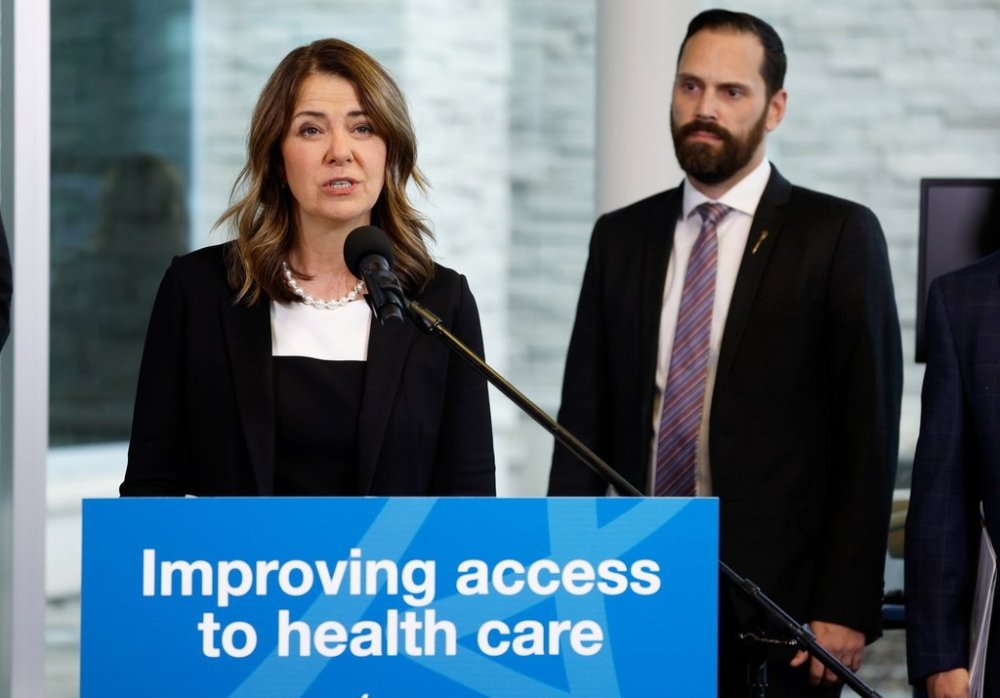Smith details Alberta plans to open door for doctors to work publicly and privately
Advertisement
Read this article for free:
or
Already have an account? Log in here »
To continue reading, please subscribe:
Monthly Digital Subscription
$0 for the first 4 weeks*
- Enjoy unlimited reading on winnipegfreepress.com
- Read the E-Edition, our digital replica newspaper
- Access News Break, our award-winning app
- Play interactive puzzles
*No charge for 4 weeks then price increases to the regular rate of $19.00 plus GST every four weeks. Offer available to new and qualified returning subscribers only. Cancel any time.
Monthly Digital Subscription
$4.75/week*
- Enjoy unlimited reading on winnipegfreepress.com
- Read the E-Edition, our digital replica newspaper
- Access News Break, our award-winning app
- Play interactive puzzles
*Billed as $19 plus GST every four weeks. Cancel any time.
To continue reading, please subscribe:
Add Free Press access to your Brandon Sun subscription for only an additional
$1 for the first 4 weeks*
*Your next subscription payment will increase by $1.00 and you will be charged $16.99 plus GST for four weeks. After four weeks, your payment will increase to $23.99 plus GST every four weeks.
Read unlimited articles for free today:
or
Already have an account? Log in here »
EDMONTON – Alberta Premier Danielle Smith revealed her government’s plan to introduce legislation to let doctors choose to work in the public and private health systems simultaneously.
In a video posted to social media Wednesday, Smith said it’s about flexibility for doctors to do more and also about cutting wait times for surgeries in the public health system.
She said the system can’t afford extra operating room time, so patients are waiting too long and some frustrated surgeons are leaving the country to make a better living.

In an effort to avoid increased taxes or health-care premiums in Alberta, Smith said surgeons would be allowed to offer elective procedures, paid for by patients or their insurance plans, after they commit to a minimum number of publicly funded surgeries per year.
For those who can afford to pay or have private coverage, they could have their surgery performed in the “off hours,” such as on weekends, Smith said.
“That means everyone on the public waitlist moves up in the queue so that they also get their publicly insured surgery done quicker than they otherwise would, and surgeons and other specialists remain in the public system,” she said.
She said spending more taxpayer money has been tried in vain for decades and isn’t sustainable.
“As our population continues to age and grow, simply spending more money on the problem clearly isn’t working,” she said.
Smith coined it the “dual practice surgery model,” but it remains unclear how upcoming legislation would affect other medical professionals, such as family doctors.
Matt Jones, the minister in charge of hospitals, told reporters the legislation won’t be limited to surgeries, and “could include family physicians.”
“The implications are probably most significant for surgical activity because we do have in Alberta 20 per cent of our surgeries provided by private providers — of course publicly funded,” he said.
Jones added that the United Conservatives will look at ways to put in safeguards, such as mandatory hours or years of service in the public system.
The legislation is expected this session, he said.
Other countries that rank higher than Canada’s universal health-care system have a private option, Jones said, and the UCP sees it as a way to connect Albertans with the care they’re asking for.
“At the same time, we’re making substantial investments into the public system — 40 per cent of our budget,” he said.
Smith’s announcement follows a report Tuesday from The Globe and Mail based on draft legislation that could see doctors able to work for fees paid by the government while also billing patients privately.
Critics, including the Canadian Medical Association, which represents physicians across the country, have warned the model could lead to more Albertans waiting longer to get treatment, and could weaken an already challenged public system.
“The evidence from around the world is clear: where a parallel private health system operates, both health outcomes and access to care are worse,” association president Dr. Margot Burnell wrote Tuesday.
On Wednesday, the Alberta Opposition NDP continued to prod Smith’s UCP in the house into calling an early election over the issue.
They say the government’s plan amounts to two-tier “American-style medicine,” and runs counter to Smith’s pledge that under her watch, no Albertan will have to pay out-of-pocket for a doctor visit or medically necessary care.
Primary Health Services Minister Adriana LaGrange shot back, saying “what we are bringing in is more like European-style health care,” and cited research from the Montreal Economic Institute think tank that suggests mixed practices can better ensure timely access to care.
The premier, in her video, said her promise remains unbroken, and everything Alberta health insurance covers today will remain covered.
“The only difference is you will likely get that public surgery more quickly than you do now, and surgeries for life-threatening conditions, such as cancer or emergency surgeries, will remain entirely publicly funded, with no privately funded option available,” she said.
Sharif Haji, NDP primary and preventive health care critic, told reporters the UCP appears bent on dismantling the public health system.
He said the changes would increase wait times because they don’t appear to address the problem of workforce planning, and it’s unclear what other services Albertans will be asked to pay for out of pocket.
“We don’t know where the limits are.”
This report by The Canadian Press was first published Nov. 19, 2025.




